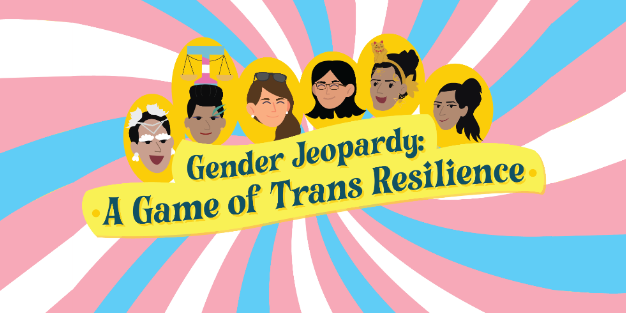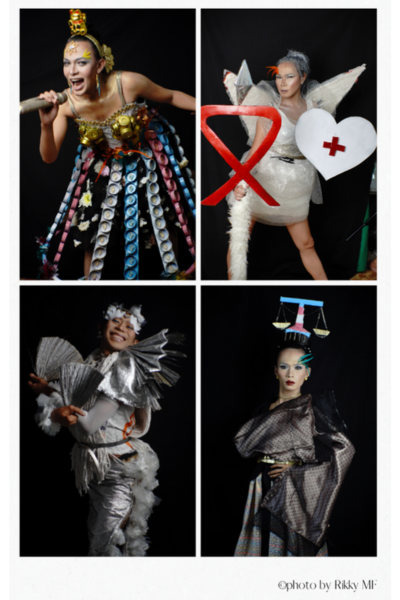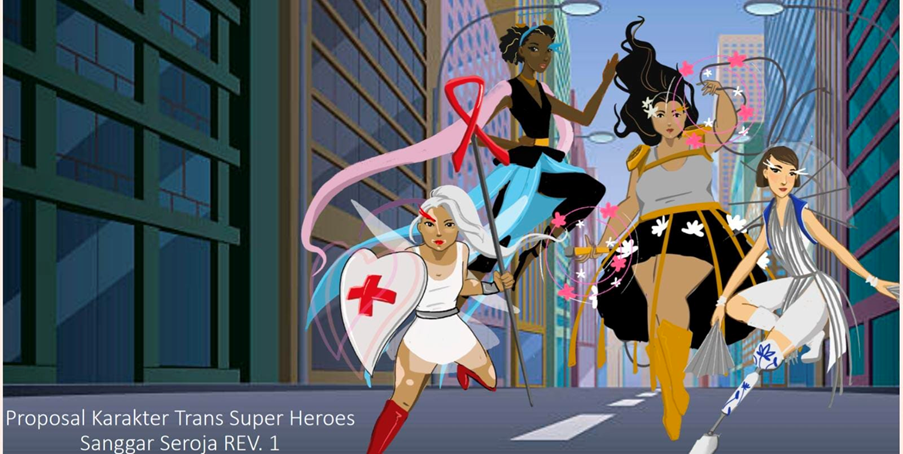New creative tools explore gender, justice and the climate in Indonesia

Researchers at the University of Leeds are collaborating with Indonesian-based organisations to support transgender women and climate activism through a board game and creative comics.
The collaboration includes Dr Desy Pirmasari and Dr Katie McQuaid in the School of Geography; Sanggar Seroja, a collective of transgender women in Jakarta; Mahawira Dillon, a leading Indonesian boardgame designer; and illustrators Kartika Luthfiyah and Leka Putra.
Their projects convey the challenges facing transgender women in Indonesia and how they intersect with broader issues like poverty, environmental injustice and climate change.
They support positive relationships between transgender women and their wider communities while promoting practical actions for the environment.
As the rights of transgender communities are increasingly attacked across the world, it is more important than ever to understand and foreground their experiences and create opportunities for collaborations in which they can speak directly about what they are facing.
Their work is part of the UK Research and Innovation-funded ‘Gender, Generation and Climate Change’ (GENERATE) project which “combines social science and the arts to strengthen the impact and inclusivity of climate resilient urban governance”.
Sanggar Seroja
Sanggar Seroja was founded in 2016 by transgender women with over 20 years of experience in the arts, particularly dance and lenong, a form of theatre traditional to the Betawi people of Jakart.
The group performs at festivals and cultural events, drawing on traditional and contemporary art forms.
The income they generate supports transgender women in the Kampung Duri, a densely populated neighbourhood whose inhabitants face high levels of poverty.
Sanggar Seroja co-created the board game, characters and comic, partly by sharing their experiences of climate change, urban life and social justice in the area.
Gender Jeopardy: A Game of Trans Resilience
The partnership’s key projects are the Gender Jeopardy board game and the Trans Superhero Perubahan Iklim (Trans Superheroes for Climate).
“We aimed to co-design a creative tool for participants to gain insights into the experiences of transgender women and understand how gender norms and inequalities manifest in intersecting disadvantages for particular communities, while also celebrating their agency, creativity and resilience,” said the researchers.
In the board game, players act as either a cisgender man, cisgender woman or transgender woman. Each player has corresponding livelihoods, salaries and impacts from fate cards.
By placing transgender women at the centre of the activity, the game attempts to highlight disadvantages without framing them as voiceless victims.
The 160 fate cards present disadvantages and risks faced by each player and the support they have to navigate them.
They include events like health crises, violent discrimination, family rejection, precarious livelihoods and environmental catastrophes. These are drawn from the experiences of Sanggar Seroja members and other transgender women.
Katie McQuaid said: “The game highlights how experiences of not just climate change, but everyday life, are shaped by our gender and how gender inequalities and discrimination exacerbate the vulnerability of sexual and gender diverse communities to issues like poverty, pandemics, environmental injustice and climate change.
"By placing transgender women at the centre of the activity, the game attempts to highlight disadvantages without framing them as voiceless victims."
The experiences represented in the cards have now formed the basis for a new crisis management guide published in partnership with the Crisis Response Management Consortium and Arus Pelangi.
These provide practical pathways to strengthen the resilience of trans women to different crises.
Playing with community leaders
In August, the team launched the game at a community event, Better World, in Jakarta.
They invited organisations for gender equality, women’s rights, LGBTQ+ advocacy and the climate as well as local leaders to play the game with transgender women.
They blended play and the luck of the game with the sharing of experiences and memories.
“The game is most effective when playing with transgender women, when the cards offer opportunities for them to share their personal experiences,” said Katie.
The response to the game was positive, with many promising to take action in their personal and working lives.
Positive feedback
Some reflections by players included:
- “I found it related to social life. The rich always survive but the poor are always on the verge. It was very related to our daily life.”
- “It’s like you wish you could get a good fate, but it’s hard to get a good fate, especially if you are the marginalised group.”
- “I think this game is very reflective. I became aware of how climate change affects trans women’s lives. Cis people can understand things that could happen to trans women that would never be experienced by cis people.”
The researchers are now connecting with new Indonesian partners to include more sexual and gender diversity and other marginalised communities in the game.
Trans Superheroes for Climate
Alongside the game, Sanggar Seroja created four trans superheroes who represent interventions for climate justice.
The heroes advocate for sustainable fashion, socio-economic empowerment, social justice and gender and climate activism.
Members of Sanggar Seroja perform as the characters in costumes created by Indonesian designers (such as Omar Al Fahd, Kartika Jahja, Muthiara Rievana and Mariana) out of recycled materials.

The superheroes are:
- Dana (top left): the Fundraising Superhero
- Asih (top right): the Restorer Superhero who loves the sick
- Vei Lan (bottom left): the Cleaning Superhero
- Tara (bottom right): the Advocacy Superhero who stands up for justice and gender equality.
To put the characters’ politics of hope into action, Desy and Katie supported Sanggar Seroja in areas of need that the group identified. These included advocacy, human rights and paralegal processes, grant management and livelihood skills.
The Trans Superhero Perubahan Iklim project has since received support from local authorities and the public; for example, with resources to expand their eco-enzyme harvesting and an invitation to lead a new waste recycling bank.
The superheroes have been invited into multiple spaces from which they have been traditionally excluded. These spaces have included embassies, culture and arts centres, international organisations like Greenpeace and Amnesty, Universities and climate marches.
In turn, this has allowed Sanggar Seroja to support more transgender women at risk.
An inclusive and equitable future
The board game and the superheroes will be brought together by Jakarta-based illustrator Leka Putra.
Leka will design a comic based on the lived experiences in Gender Jeopardy. These will become the backstories of the superhero characters, highlighting the ways they contribute to their communities amidst the discrimination they face.
The comic will visualise the alternative, inclusive and equitable future that the superheroes create.

 Illustration by Leka Putra
Illustration by Leka Putra